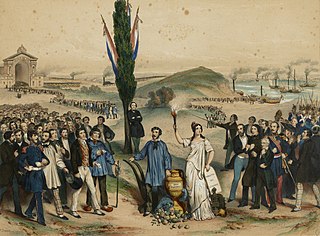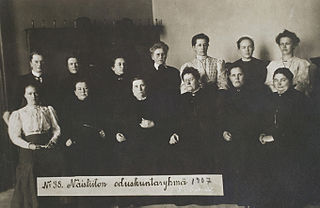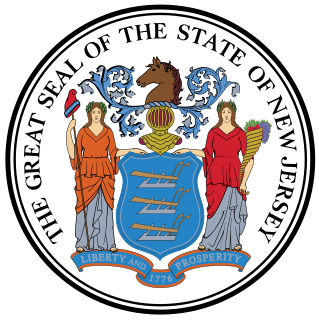
The Constitution of the State of Vermont is the fundamental body of law of the U.S. state of Vermont. It was adopted in 1793 following Vermont's admission to the Union in 1791 and is largely based upon the 1777 Constitution of the Vermont Republic which was ratified at Windsor in the Old Constitution House and amended in 1786. At 8,295 words, it is the shortest U.S. state constitution.

Suffrage, political franchise, or simply franchise is the right to vote in public, political elections. In some languages, and occasionally in English, the right to vote is called active suffrage, as distinct from passive suffrage, which is the right to stand for election. The combination of active and passive suffrage is sometimes called full suffrage.

The concept of universal suffrage, also known as general suffrage or common suffrage, consists of the right to vote of all adult citizens, regardless of property ownership, income, race, or ethnicity, subject only to minor exceptions. In its original 19th-century usage by political reformers, universal suffrage was understood to mean only universal manhood suffrage; the vote was extended to women later, during the women's suffrage movement.
A constituent assembly or constitutional assembly is a body or assembly of popularly elected representatives composed for the purpose of drafting or adopting a constitutional-type document. The constituent assembly is a subset of a constitutional convention elected entirely by popular vote; that is, all constituent assemblies are constitutional conventions, but a constitutional convention is not necessarily a constituent assembly. As the fundamental document constituting a state, a constitution cannot normally be modified or amended by the state's normal legislative procedures; instead a constitutional convention or a constituent assembly, the rules for which are normally laid down in the constitution, must be set up. A constituent assembly is usually set up for its specific purpose, which it carries out in a relatively short time, after which the assembly is dissolved. A constituent assembly is a form of representative democracy.
Elections in South Africa are held for the National Assembly, provincial legislatures and municipal councils. Elections follow a five-year cycle, with national and provincial elections held simultaneously and municipal elections held two years later. The electoral system is based on party-list proportional representation, which means that parties are represented in proportion to their electoral support. For municipal councils there is a mixed-member system in which wards elect individual councillors alongside those named from party lists.

Elections in Benin take place within the framework of a multi-party democracy and a presidential system. Both the President and the National Assembly are directly elected by voters, with elections organised by the Autonomous National Electoral Commission (CENA).

The Commonwealth Franchise Act 1902 was an Act of the Parliament of Australia which defined a uniform national criteria of who was entitled to vote in Australian federal elections. The Act established universal suffrage for federal elections for those who are British subjects over 21 years of age who have lived in Australia for six months, with some qualifications. It granted Australian women the right to vote at a national level, and to stand for election to the Parliament.

The Chamber of Deputies, abbreviated to the Chamber, is the unicameral national legislature of Luxembourg. Krautmaart is sometimes used as a metonym for the Chamber, after the square on which the Hôtel de la Chambre is located.

A legislative circonscription is a multi-member electoral constituency that elects representatives ('deputies') to Luxembourg's unicameral national legislature, the Chamber of Deputies.

There have been twelve referendums in Lithuania since it declared independence from the Soviet Union on March 11, 1990. Because of strict requirements only four referendums were successful. Older Lithuanian laws required that more than a half of all registered voters would vote in support of a proposal for it to become a binding obligation to the government. In 2002, this requirement was lowered to one third of all registered voters.

A constitutional referendum was held in France on 5 May 1946. Voters were asked whether they approved of a new draft Constitution proposed by the Constituent Assembly elected in 1945.

The Constitution of the State of Rhode Island and Providence Plantations is a document describing the structure and function of the government of the U.S. State of Rhode Island.

Elections in New Jersey are authorized under Article II of the New Jersey State Constitution, which establishes elections for the governor, the lieutenant governor, and members of the New Jersey Legislature. Elections are regulated under state law, Title 19. The office of the New Jersey Secretary of State has a Division of Elections that oversees the execution of elections under state law. In addition, the New Jersey Election Law Enforcement Commission (ELEC) is responsible for administering campaign financing and lobbying disclosure.
The right of foreigners to vote in the United States has historically been a contentious issue. A foreigner, in this context, is an alien or a person who is not a citizen of the United States.

The current Constitution of Madagascar was, according to the national electoral commission, endorsed by a majority of voters in the constitutional referendum held on 14 November 2010. The new constitution launched the Fourth Republic of Madagascar and was widely seen as an attempt to consolidate and legitimise the rule of Andry Rajoelina and his High Transitional Authority government which was installed after a military-backed coup d'état against President Marc Ravalomanana at the beginning of the ongoing national political crisis. One substantive change from the constitution of the Third Republic was to lower the minimum age for presidential candidates from 40 to 35. This made Rajoelina, aged 36 at the time, eligible to stand in presidential elections.
Black suffrage is Black people's right to vote. Black suffrage has been at issue in countries established under conditions of white supremacy. It may be limited through official or informal discrimination. In many places, black people have obtained suffrage through national independence. It should also be pointed out that "Black suffrage" in the United States in the aftermath of the American Civil War explicitly refers to "Black Male Suffrage". While women citizens, regardless of race, held rights to vote in some states, at the federal level, the U.S. Constitution was not interpreted to prohibit discrimination against women in voting, regardless of their race, until the passage of the 19th Amendment which was ratified by the United States Congress on August 18 and then certified by law on August 26, 1920.

Proposition 4 of 1911 was an amendment of the Constitution of California that granted women the right to vote in the state for the first time. Senate Constitutional Amendment No. 8 was sponsored by Republican State Senator Charles W. Bell from Pasadena, California. It was adopted by the California State Legislature and approved by voters in a referendum held as part of a special election on October 10, 1911.

An independence referendum was held in the Comoros on 22 December 1974. The overall result was a strong "yes" vote, with 94.57% of voters voting for independence and almost all the "no" votes being cast in Mayotte, where there was a majority for remaining under French control. In contrast, on Mohéli only five out of 6,059 votes were against independence. Voter turnout was 93.3%.

The constitutional referendum was held on 19 March 1933.

















